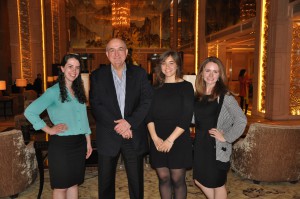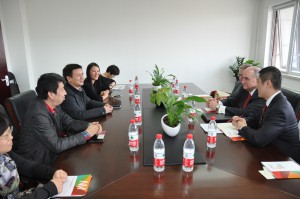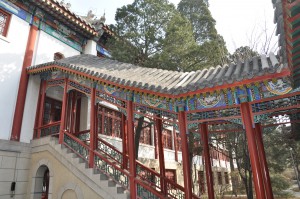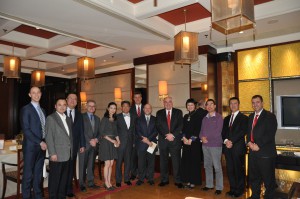A powerful prelude in Beijing
All it takes is a day in Beijing (which is about all the time the IU delegation will spend here before heading on to Korea) to see and feel the major impact the university’s international engagement efforts are having on IU students, faculty, alumni and friends.
Indeed, in the span of just over 24 hours, IU President Michael A. McRobbie and his fellow delegation members experienced, albeit briefly, what it means for IU students to have the opportunity to study abroad in a city that dates back three millennia and continues to be the political, cultural, economic and educational epicenter of the world’s most populous nation.
They saw, first-hand, the impressive contributions IU faculty have made – and continue to make – to scholarly discussions and debate about the most important issues facing the global community.
They reconnected with the university’s proud past via IU’s ever-growing cohort of international alumni, whose cultural contributions to IU’s campuses are matched only by the successes they’ve gone on to have in their lives and careers, and the pride they feel in forever being Hoosiers.
And they gained a positive glimpse of the future, courtesy of several productive discussions about possible collaborations that could bring about greater faculty and student exchanges and exciting new academic degree programs.
The delegation’s short layover in Beijing, which encompassed visits with IU students, faculty and alumni, and meetings at China’s prestigious Peking University, was set up to be a prelude of sorts to several historic upcoming concerts this week in Seoul, South Korea, by IU’s world-renowned Jacobs School of Music. But the brevity of the China portion of the trip didn’t stop big activities from happening in Beijing.
Here are a few of the highlights of a whirlwind day in China’s capital city:
A rousing dinner: Want to quickly jettison your jet lag after a 14-hour flight? Go to dinner with Grace Jaroscak, Kelly McCarthy and Eleanor Wannemuehler. The three IU students, who are studying in Beijing as part of the IU Chinese Flagship Program (and will all graduate this year), talked enthusiastically and passionately Monday evening about their work and travel here, including the time they’ve spent learning the complex Chinese language; getting acquainted with Chinese culture and history; experiencing the vastly different regions of the world’s largest country; and even managing to partake in some fun extracurricular pursuits. (Who knew you could learn to swing dance in China?)

IU President Michael A. McRobbie poses for a picture with IU students Grace Jaroscak, Kelly McCarthy and Eleanor Wannemuehler. All three are studying in China this year.
“China in the Middle East”: President McRobbie delivered the opening remarks at this two-day conference being hosted by Peking University and the IU China Office, one of IU’s two new global gateway facilities and the home base for all of its activities and outreach here. With its longstanding connections in the Middle East and as a home to a large and well established Muslim population, China will continue to be a major player in Middle Eastern affairs. As a result, researchers from Indiana, the nation and the world will have “unprecedented opportunities,” according to McRobbie, to learn more about China’s important interactions in this tumultuous region. The conference served as a “wonderful example,” McRobbie added, “of how cooperation between Indiana University faculty and colleagues in China can lead to the realization of admirable goals that can improve research and scholarship in both our countries and can benefit scholars and institutions around the world.”
More potential at PKU: Peking University and IU’s Bloomington campus are both rightly recognized for the beauty of their respective campus grounds and traditional architecture. But the similarities between PKU and IU go beyond simple aesthetics. The two premier teaching and research universities have been productive partners since the 1990s, with strong connections in history, medicine, the humanities and graduate education.

Members of the IU delegation meet with their counterparts at Peking University’s School of New Media.
Today’s trip to PKU served to strengthen the longstanding relationship between the two schools, while also signaling potential new areas of collaboration, such as arts administration and music, international studies and mass media, that could open up many new learning and exchange opportunities for IU students and faculty. A tour of PKU’s new School of New Media, launched last year just a few months before IU introduced its Media School, was particularly illuminating and inspiring. The school’s guiding philosophy – focused on the convergence and creative development of all types of media – neatly matches that of IU’s new school, which continues to enhance its curriculum to give students full exposure to modern communications.
IU’s Chinese alumni: A stop in Beijing wouldn’t be complete without checking in with IU’s proud Chinese alumni. Listening to them talk and reminisce at the end of a busy day highlighted how much even a quick stop-in visit means to IU’s growing number of global graduates – there are now more than 4,000 IU alumni affiliated with China living around the world – who are eager to share their memories of their time at IU, the lessons they learned and the friendships they made while there.
To this end, I happily reconnected with one of my former journalism classmates, whom I hadn’t seen in 16 years, and who had taught me and her fellow students many lessons about her country and its culture. It was a nice reminder that, as much as an IU education means to foreign students who travel to Indiana from far away places like China, the contributions they, themselves, make to our campus communities and the bonds they form can be just as meaningful.
Tags: Beijing, China, China in the Middle East, Chinese Flagship Program, IU alumni, IU Alumni Association, IU China Office, IU Media School, Jacobs School of Music, Korea, Michael A. McRobbie, Peking University, Seoul




